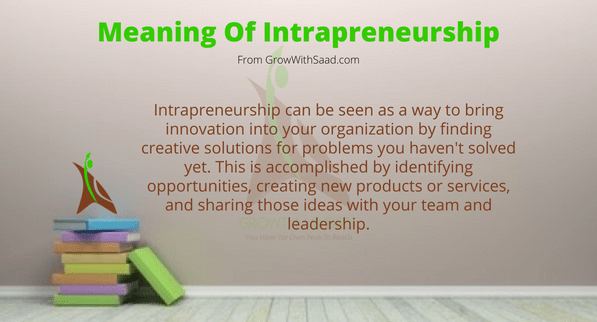Learning the difference between intrapreneurship and entrepreneurship can be of great help when people generally use these terms interchangeably. With close to 600 million entrepreneurs present worldwide today, you may come across the term entrepreneurship on a daily basis but not intrapreneurship.
And as business owners or aspiring business owners, it’s always advisable that we are comfortably aware of the difference between intrapreneurship and entrepreneurship.
But before we begin with the difference between intrapreneurship and entrepreneurship, let’s first know a little about both these terms.
Post Contents
Meaning Of Intrapreneurship
Intrapreneurship is simply entrepreneurship within an organization. Intrapreneurship implies using available resources at your organization to come up with innovative solutions to the challenges you encounter at your workplace. The process of intrapreneurship may involve devising changes to existing products or services or coming up with completely new ideas to make the existing tasks easier and more efficient.

Intrapreneurship can also be seen as a way to bring innovation into your organization by finding creative solutions for problems you haven’t solved yet. This is accomplished by identifying opportunities, creating new products or services, and sharing those ideas with your team and leadership.
So, intrapreneurship can be used to solve a problem, create new products or services, or perform market research and strategic planning. Intrapreneurs are typically employees within an organization who have been given the freedom to explore opportunities outside their normal job description. They work under the direction of a leader or manager but must be approved by their supervisor before they can pursue any idea outside the company.
Thus, intrapreneurship allows you to engage with risk-taking while still being accountable for results. It’s a way to help drive innovation within your organization while maintaining control over its execution. It can also be used to find new markets for the company or for products and services that are already being sold.
Meaning Of Intrapreneur
The term “intrapreneur” comes from the Italian word intraprendere which means “to take upon oneself” or “to undertake”. In other words, intrapreneurs take on a new project within their organization and try to change it by using their entrepreneurial skills such as problem-solving, creativity, and innovation.
Intrapreneurs are those who are trying to change the culture of their organization through innovation, creativity, and new ways of doing things. They want to innovate in order to make their organizations more competitive or profitable. The best way to do this is to work with the existing employees and managers of the organization.
An intrapreneur is someone who is entrepreneurial within their organization, but not necessarily in their own business. They’re just as likely to have a career as an employee as they are as an entrepreneur.
Importance Of Intrapreneurship
In today’s world, the importance of intrapreneurship is far greater than it was ever before. The reason being the world today undergoes drastic changes every other day which presents any organization with unprecedented challenges and poses a great threat to its existence if they fail to keep up with the changes taking place in its respective industries.
The biggest example before us is the recent Covid-19 pandemic. This one pandemic is responsible for the world economy taking a massive hit and plunging by a staggering value of $28 trillion. Moreover, the widescale adoption of artificial intelligence technologies by big corporations is expected to eat up to 800 million job opportunities for ordinary men across the globe.
The factors like rapid technological advancements, worldwide environmental crisis, and societal instability combined with many other such factors add to the woes of ordinary citizens. And all these factors should be enough to draw one’s attention to the importance of intrapreneurship in today’s world.
Moreover, the importance of intrapreneurship isn’t expected to wane in the near future as big corporations have just begun to consider intrapreneurship qualities crucial when it comes to hiring employees for their organizations.
In 2020 the global recruitment firm Michael Page named intrapreneurship as the most desirable skill of the year.
Eric Schmidt, former CEO at Google once said, “to upskill the workforce in entrepreneurial skills is critical to surviving through this new era.”
Meaning Of Entrepreneurship
Entrepreneurship can be defined in many ways: as the pursuit of opportunity with creative destruction as its goal; as the management of uncertainty through imagination and creativity; or simply as starting your own business from scratch on your own (i.e., you’re self-employed).

Entrepreneurship is a way of thinking, and as such it’s not limited to technical people or even people who have business experience. Employers are always looking for new ideas, and they want to see that their employees are thinking creatively, not just following procedures.
Entrepreneurship is the process of setting up a business or businesses, and taking on financial risks in the hope of profit. An entrepreneur may choose to form a company and sell products or services under its own name; alternatively, an entrepreneur may form a corporation or limited liability company (LLC) and hire employees to perform work for it.
However, entrepreneurs do not always have to make money by selling goods through retailers; some may earn revenue from providing services instead.
Entrepreneurship is not restricted to individuals or small firms; large companies can also be entrepreneurial if they have the resources, foresight, and management skills necessary to innovate. Some large companies are known as intrapreneurs because they operate within an organization but function independently.
At its heart, entrepreneurship is about making something better than it was before; it’s about building something better than what already exists on the market. For innovation to occur, however, there must be room for improvement in an existing product or service.
Difference Between Intrapreneurship And Entrepreneurship
After having learned about entrepreneurship and intrapreneurship, let’s have a look at some of the most basic differences between intrapreneurship and entrepreneurship.

Goal Setting
Intrapreneurs are more focused on the organization as a whole. They identify potential opportunities for growth, then work with senior leaders to identify how those opportunities can be achieved.
Intrapreneurs have the organization’s resources at their disposal. They can benefit from the organization’s reputation, supportive environment, and human capital.
Entrepreneurs can create new markets; intrapreneurs can build upon existing ones. Entrepreneurs want to get into a market where they can succeed, while intrapreneurs want to help develop existing products and services within their organizations.
Entrepreneurs focus on creating a business from scratch and making it successful. They may not be involved in the day-to-day operations of their businesses, but they are still focused on their vision and goals.

Support System
Entrepreneurs may act alone, while an intrapreneur is more likely to work with other employees.
Entrepreneurs have to worry about many things including finance and sales, while an intrapreneur focuses on developing products with the support of the organizations they may be working with.

Inner Drive
The inner drive is one of the qualities of a good entrepreneur. Entrepreneurs are driven by passion and vision. They are risk-takers as they have a clear vision of how their ideas can make a difference in the world. Entrepreneurs look at the big picture and focus on the long-term benefits of their venture, which is why they tend to be more successful than other types of businesses.
An intrapreneur is typically someone who has been promoted into a position where they can make decisions on behalf of the company. Their role may be defined by how well they follow directions from above, or it may simply be that they have been given responsibility for some aspect of running a business that needs to be improved upon.

Resource Availability
Entrepreneurs tend to focus on ideas and opportunities that are new or have not been done before. They spend a lot of time exploring and testing those ideas in order to get them off the ground. This is what they mean by “build it and they will come”.
The challenge with this approach is that new ideas do not always work. There can be many reasons for this failure: poor planning, lack of resources, or simply bad luck. Also, entrepreneurs have limited access to resources, they mostly rely on their personal network and resources.
On the other hand, intrapreneurs tend to focus on what already exists in an organization and how they can use this information as a foundation on which to build something new. They spend less time searching for new ideas but more time finding opportunities that already exist within an organization (where there is usually plenty of room for improvement).
Also, intrapreneurs enjoy access to their organization’s human, financial, technological, and other necessary resources.
CONCLUSION
Hope after you have completed reading this article, your concept about the differences between the concepts of intrapreneurship and entrepreneurship is now clear. What do you plan for your entrepreneurial journey? Let us know in the comments section below.
We’d love to hear from you:)

